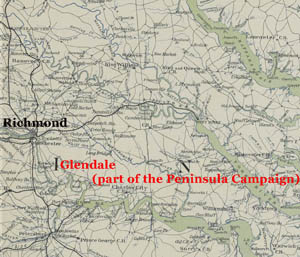Peninsula Campaign
"You Have No Idea of the Imbecility of Management Both in Action and Out of It"
The illusion of a short war was shattered by the failure of Gen. George B. McClellan’s Peninsula Campaign, an advance known for its high casualty rates and its stalemate before Richmond. While many at home still romanticized the war, the extreme heat, the breakdown of supply lines, and the haphazard and incompetent medical care for the sick and wounded, undermined the morale of the Union Army.
Eyewitness Account
 Letter from Francis Barlow to Edward Barlow, 8 July 1862
Letter from Francis Barlow to Edward Barlow, 8 July 1862
In this letter to his brother Edward, Francis Channing Barlow (1834-1896) discusses conditions in Virginia after the Peninsula Campaign and shares his hope of being able to see his wife.
 Francis Barlow
Francis Barlow
Raised in the utopian community of Brook Farm in West Roxbury, Mass., Francis Channing Barlow served in a New York regiment in the Civil War.
James Jackson Lowell and the 20th Massachusetts
Lt. James Jackson ("Jim") Lowell had been wounded in the leg at Ball's Bluff. At the Battle of Glendale on 30 June 1862, in the cruel vernacular of the now-hardened veterans, he was "gut shot"—just as Putnam had been—and knew what his fate would be. The Rev. Cyrus A. Bartol eulogized James Jackson Lowell in The Remission by Blood, a sermon delivered in the West Church in Boston where Lowell's father and grandfather had preached. Bartol said of Lowell, "A purer heart has not ceased to beat. He cannot be better described than in the word thoughtful." Like many ministers both North and South, Bartol struggled with the meaning of blood sacrifice caused by the war, taking from 9 Hebrews, "Without shedding of blood there is no remission."
 James Jackson Lowell
James Jackson Lowell
Lt. James Lowell of the 20th Massachusetts Infantry Regiment. He died on 6 July 1862, of wounds received at the Battle of Glendale during the Peninsula Campaign.
 Lt. Henry Livermore Abbott
Lt. Henry Livermore Abbott
This carte de visite depicts Lt. Henry Livermore Abbott of the 20th Massachusetts Infantry Regiment.
 Assistant Surgeon Nathan Hayward
Assistant Surgeon Nathan Hayward
This carte de visite depicts Assistant Surgeon Nathan Hayward of the 20th Massachusetts Infantry Regiment.
 Lt. Col. Francis Winthrop Palfrey
Lt. Col. Francis Winthrop Palfrey
This carte de visite depicts Lt. Col. Francis Winthrop Palfrey of the 20th Massachusetts Infantry Regiment.
An example of the inter-family connectedness of the regimental units during the Civil War can be seen in the Holmes-Putnam-Lowell familes. Capt. Oliver Wendell Holmes, Jr. was the cousin of William Lowell Putnam, James Jackson Lowell, and Charles Russell Lowell, Jr. At the Battle of Ball's Bluff in October 1861, Holmes, wounded by a bullet in his chest, lay next to the dying William Lowell Putnam. Recovered, Holmes was also present when James Jackson Lowell died the following year.
 Capt. Oliver Wendell Holmes, Jr.
Capt. Oliver Wendell Holmes, Jr.
This carte de visite depicts Capt. Oliver Wendell Holmes, Jr., of the 20th Massachusetts Infantry Regiment, was a cousin of James Jackson Lowell.
 Charles Russell Lowell, Jr.
Charles Russell Lowell, Jr.
This carte de visite depicts Charles Russell Lowell, Jr., an aide-de-camp to George B. McClellan during the Peninsula Campaign.
Nurses
There is ample evidence that many of the Union soldiers were both unprepared for battle and frequently in need of medical assistance. Nurses and other medical staff traveled the country as they accompanied the soldiers into the field, and women's contributions to the defense of the Union cannot be understated. Inspired by the work of nurses, the aspiring writer Louisa May Alcott served briefly as an army nurse.
 Letter from Louisa May Alcott to Hannah Stevenson, 26 December 1862
Letter from Louisa May Alcott to Hannah Stevenson, 26 December 1862
Louisa May Alcott (1832-1888), working briefly as an army nurse in the Union Hotel Hospital in Georgetown, wrote this letter to her friend Hannah Stevenson (1807-1887) in December 1862.
 Scenes from the Battle-field at Gettysburg, PA. Second Corps Hospital.
Scenes from the Battle-field at Gettysburg, PA. Second Corps Hospital.
 "Diagrams Illustrating the Principal Means Used In Transporting the Sick and ..."
"Diagrams Illustrating the Principal Means Used In Transporting the Sick and ..."
